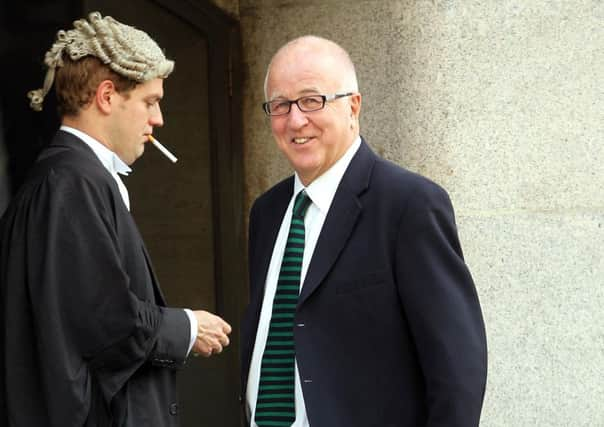Life and troubled times of fiddling MP Denis MacShane


Allegations about the Labour former minister’s activities first surfaced as Westminster was engulfed by the wider scandal in 2009.
The Commons standards commissioner John Lyon launched a formal investigation into MacShane’s claims for laptops and “translation services” that July.
Advertisement
Hide AdAdvertisement
Hide AdIn October 2010 Mr Lyon handed the investigation over to Scotland Yard, telling them he had seen invoices “which I believed might have been produced in a way which could raise questions of possible criminality”.
Officers were not given further details or access to key evidence the commissioner had gathered - including damning letters from MacShane in which he admitted using a “nom de plume” to fake thousands of pounds-worth of receipts from a body he controlled, the European Policy Institute (EPI).
He wrote that the EPI had been a “convenient vehicle” to fund research trips to the continent.
The material was withheld by the Commons authorities on the basis that it had been generated during parliamentary proceedings, and so was covered by the age-old principle of parliamentary privilege intended to guarantee politicians freedom of speech.
Advertisement
Hide AdAdvertisement
Hide AdThe police were given access to MacShane’s receipts and expenses records.
But after considering the case for nearly two years, they announced in July 2012 that it was being dropped on advice from the Crown Prosecution Service.
With the threat of criminal charges seemingly lifted, Mr Lyon re-activated his investigation into MacShane’s claims.
And last November the cross-party Commons Standards and Privileges Committee finally recommended a 12-month suspension from the House, describing it as the “gravest case which has come to us for adjudication, rather than being dealt with under the criminal law”.
Advertisement
Hide AdAdvertisement
Hide AdMacShane, the MPs concluded, had filed “19 false invoices over a period of four financial years which were plainly intended to deceive the parliamentary expenses authorities”.
The report also disclosed, for the first time, the scores of pages of correspondence between the commissioner and MacShane.
The ensuing outcry forced MacShane’s resignation as an MP, and police said they would be looking to see whether the information allowed them to proceed with the case against him.
Even though the correspondence had been put into the public domain, the Commons authorities insisted it was still covered by parliamentary privilege - and so would not be admissible in court.
Advertisement
Hide AdAdvertisement
Hide AdClerk of the Journals Liam Laurence Smyth suggested the only way police could use the material was as a “map” to further their own inquiries.
It took detectives another two-and-a-half months to decide that there were grounds to reopen their investigation.
And it was not until July that MacShane was formally charged with false accounting.
MacShane was openly dismissive of the expenses scandal when it first emerged, claiming it would be seen in the future as “a wonderful moment of British fiddling”.
Advertisement
Hide AdAdvertisement
Hide AdBut after apparently shrugging off the growing outrage in 2009, he then found himself under investigation over fiddling expenses and ultimately was forced to quit as an MP.
MacShane announced his resignation in November last year after the Committee on Standards and Privileges had recommended that he should be suspended as an MP for 12 months after it found he submitted 19 false invoices “plainly intended to deceive” Parliament’s expenses authority.
A multi-lingual Europhile, who served as Europe minister for three years under Tony Blair and worked for the BBC, he had been a regular commentator in the media both at home and abroad.
But the sleaze watchdog’s findings over his expenses were the latest in a number of issues - professional, political and personal - that have made him the subject of the story as well.
Advertisement
Hide AdAdvertisement
Hide AdBorn in Glasgow in 1948, he was educated at Merton College, Oxford - and later in life earned a PhD at Birkbeck College in London - before spending eight years as a BBC reporter and presenter from 1969.
He was sacked from that job - for which he switched from using his Polish father’s surname of Matyjaszek to his Irish mother’s - over a call made under a false name to a talk show he worked on.
After a spell as president of the National Union of Journalists (NUJ) he went into self-described foreign “exile’’ on the election of Margaret Thatcher’s Tory government in 1979.
He was condemned by British Muslims after telling them they must condemn terrorism more strongly in a speech a day after 27 people died in two bomb blasts in Istanbul, Turkey.
Advertisement
Hide AdAdvertisement
Hide AdHe toned down a speech in which he had planned to say they must choose between the “British way’’ of political dialogue and Islamic terrorism.
Another issue on which he has spoken out is the phone hacking scandal - and he received £32,500 in damages from News International over his own privacy being breached.
His then partner, writer Joan Smith, told the Leveson Inquiry that her own phone was also hacked six weeks after the MP suffered a major personal tragedy with the death of his daughter.
A skydiving accident in Australia in 2004 took the life of 24-year-old Clare - whose mother was the newsreader Carol Barnes, another former partner of the MP who has also been married twice.